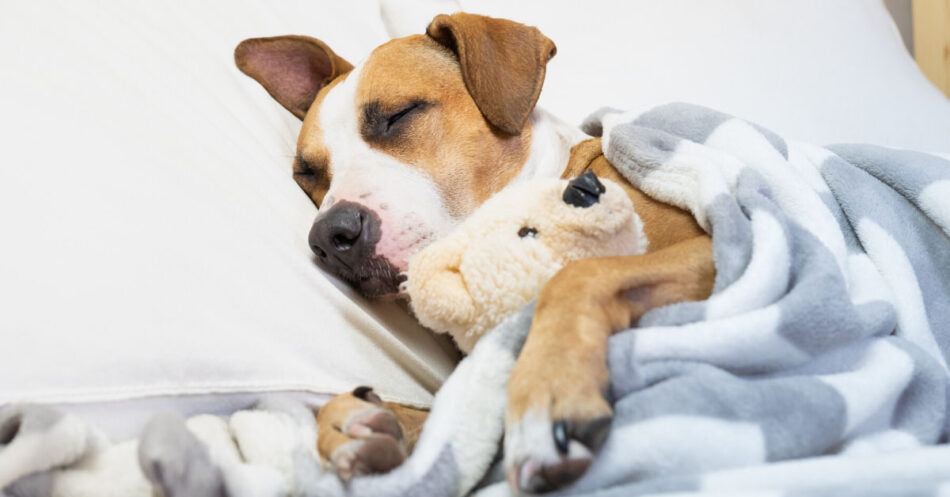
5 Helpful Tips on How to Calm a Restless Dog at Night
This post may include affiliate links. Please read my disclosure policy.
Many dogs come alive when the lights go down. They might get the “zoomies,” or they may simply pace or want to play. Aside from separation anxiety, nighttime anxiety can be one of your canine care hurdles. This isn’t great news for us pet parents who are ready to turn in for the night.
Why Your Dog Is Restless at Night
Below are some reasons why your pup may be having difficulty sleeping or settling down for the night.
- Lack of exercise or mental stimulation. A dog with pent-up energy is like a kettle ready to whistle! If they haven’t had enough exercise during the day, they’re ready to party all night.
- Anxiety or stress. Changes in the environment, a new family member, or even thunderstorms can make your dog restless. All forms of anxiety, whether it’s senior dog anxiety or separation anxiety, can affect your dog’s life in more ways than just their sleep, so consult your veterinarian on how to handle canine anxiety.
- Medical issues. Just like us, dogs can suffer from certain ailments and chronic pain that make getting comfortable a tricky task. An example is diabetes, as the need to urinate frequently can make it difficult for your pup to relax and sleep. Another possible disease that’ll make your pup restless at night is canine cognitive dysfunction, a disease that affects a senior dog’s brain.
- Diet. Restlessness can be caused by an upset stomach due to dietary indiscretion or eating something they shouldn’t, like garbage or table scraps. Food change can also cause digestive problems, which is why the transition should be done gradually over one to two weeks.
- Lack of routine. Dogs, like kids, thrive on routine. A chaotic schedule can throw their internal clock off balance and disrupt their sleep patterns.
Understanding what’s keeping your dog awake at night can be as easy as pie once you know what to look for. Howling or whining at night is quite common for anxious furry friends, especially for younger dogs. Our little pups may be adjusting to their new environment as they just recently separated from their moms. Other signs of restlessness may include pacing back and forth, whining or barking, and constantly changing sleeping positions.
How to Calm Down a Dog Before Bedtime
Helping your dog wind down for bedtime doesn’t have to be a tough task. With a few simple tricks, you can create an atmosphere that soothes your pup and sets the stage for a good night’s rest.
Step 1: Calm Them with Together Time
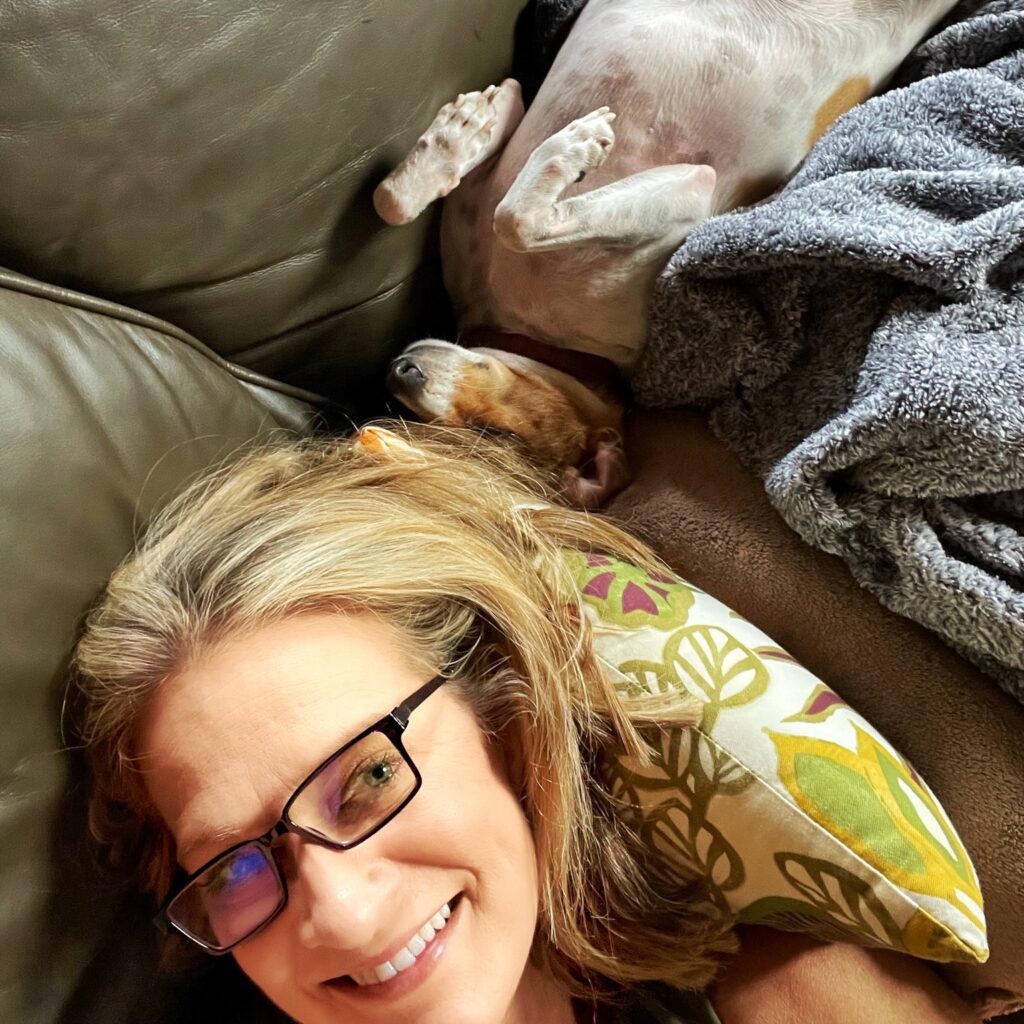
Dedicating time each evening to help your dog unwind will play a crucial role in their ability to relax before bedtime. It’s a great opportunity for both of you to unwind after a busy day.
Initially, you might engage in light play, such as a gentle chase around the house or a game of tug-of-war, but be sure to avoid vigorous activities as bedtime approaches since this can inadvertently boost their energy levels.
As your evening progresses, observe your dog’s cues indicating they’re beginning to tire—this could be pausing more often or taking a drink of water. At this point, transition to more serene activities that you both enjoy, such as snuggling, gently stroking their coat, or providing a soothing ear rub. These quiet moments of connection can significantly aid in relaxation, preparing them for sleep.
This shared time doesn’t need to be extensive; even 10–15 minutes may suffice for some dogs. The goal is to provide reassurance and comfort, letting your dog know you’re there for them. This is particularly important for dogs experiencing separation anxiety, as it helps them feel more secure.
Opt for gentle petting or quiet play that encourages relaxation, steering clear of any play that could rouse them instead of calming them down. Through these nurturing routines, you can set the stage for a peaceful night’s rest for your pup.
Step 2: Give a Calming Treat
Giving your dog a treat during your dog’s routine at bedtime will give him something special to look forward to every night. Associating bedtime with a yummy snack may also help you train your pup to settle down for bed.
Just like many dogs who seem to know somehow when it’s time for their people to get home or when it’s time for dinner, you may soon find that your own pooch is reminding you to give him his treat so he can go to sleep!
ElleVet’s organic Calm and Comfort chews support stress-free relaxation with their clinically tested blend of complete spectrum proprietary hemp oil! You can give this an hour before bedtime to help your pup keep calm.
What I love about these, and all of the products from ElleVet, including their hemp oil, is that they’re veterinarian-tested and recommended. With their dosage guide, I can confidently give my pets the right dose, knowing that it’s safe for their specific weight class.
Step 3: Provide a Secure, Comfy Place to Sleep
Does your dog sleep in the same place every night? Most likely, the answer is yes! Whether it’s their own dog bed, a favorite spot on the floor, or a place in bed with you, most pups sleep the best when they’re in their normal sleeping spot.
Make sure your dog has a comfortable, dedicated sleeping area. For dogs with joint pain or older dogs, orthopedic beds can offer extra support. Consistency in where they sleep can also help reinforce a routine.
My dog, Tulip, sleeps in bed with us, usually right between us, with her head poking out. But when she takes her naps, she loves her peach-colored round donut bed. It’s great for dogs who love to curl up, and I love it because I can throw the whole thing in the washing machine.
My dog, Chilly, who passed over the rainbow bridge in 2021, loved a bed with bolster sides. It gave him enough room to sprawl out a bit with the added security of something to snuggle up against for the night. This one is made with memory foam (great for a senior dog’s aching joints), and it has a machine-washable cover.
If your dog sleeps on the bed with you, consider giving them their own designated spot on the bed, using a blanket to carve out a little nest. They may wander from it during the night, but knowing they have their own area can help them feel secure enough to fall asleep at night.
If your dog won’t sleep at night, take a look at his bed. If he doesn’t use it or no longer uses it regularly, he likely needs a new bed better suited to his needs.
Step 4: Find His Favorite Cuddle Toy
Do you remember how safe and secure you felt as a child when you snuggled in bed with your favorite teddy bear? Well, dogs can also find security from a special soft toy.
Now, not just any old toy will make the paw-fect bedtime buddy. Don’t give him anything with squeakers—that will probably just wind him up and get him in the mood to play! Similarly, anything you usually use to play fetch or tug with may not be the best choice. Ideally, you want a toy that only comes out at bedtime or other “down” times.
This adorable duck makes the perfect bedtime buddy. It’s super soft, squeak-free, and it won’t encourage thoughts of rambunctious play.
Pin Me!
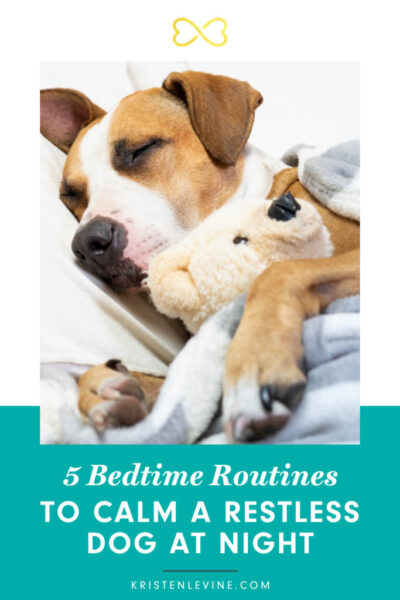
Step 5: Use Calming Scents and Sounds
Many pet parents ask, “What can I give my dog to sleep at night?” However, rather than immediately turning to medications, you might try some more natural therapies.
Some scents can have a calming effect on the human members of the family, and the same is true for our tail-wagging friends. Spraying your dog’s bed or bedtime toys with a calming blend of essential oils is a great way to alleviate any lingering anxiety from the day and get your pup ready to sleep through the night.
I love this all-natural essential oil spray from ThunderEssence, the makers of the ThunderShirt! It’s made with lavender, chamomile, and Egyptian geranium essential oils, and it smells amazing! I’m tempted to spray it on my own pillow, but for now, I’ll save it for Tulip’s bed and cuddle toys!
Your pup’s sensitive hearing may be able to pick up unfamiliar sounds or noises that you can’t. This can make them anxious or curious. Calming music, like classic music, can also help calm down a dog and get him ready for bed. I use the Zoundz app for my pets. It’s designed specifically to reduce a dog’s anxiety. I also love that every download contributes toward the Harmony Project, a program designed to alleviate anxiety in shelter pets.
FAQs
What If My Dog Is Restless at Night While I’m Crate-Training Him?
If your dog is restless while you’re crate training him at night, start by placing the crate in your bedroom so he doesn’t feel alone. Introduce the crate positively with treats and toys to make it inviting. Gradually increase the time the dog spends in the crate with the door closed during the day. When the dog is sleepy, encourage him to nap in the crate. Once he’s used to the crate during the day, he should be more comfortable at night. Check out this guide on how to crate-train anxious and senior dogs.
Should I Sleep with My Dog?
I mentioned that I sleep with Tulip, but deciding to sleep with your dog is a personal choice! Sleeping with your pup has quite a few potential benefits, such as emotional support and physical health improvements, including reduced anxiety (for both of you) and lower blood pressure. It also promotes bonding and can strengthen your immune system. However, sleeping with your pup may also disturb your sleep and make your allergies or other health issues worse.
You may want to wait until a dog is fully trained and to ensure they also have their own bed, which provides them with their own personal space. This approach can help manage any restlessness at night and maintain a good sleep environment for both you and your pet.
When to Get Help from the Professionals
Even with our best efforts, some dogs will always be more naturally prone to hyperactivity and anxiety. As pet parents, we sometimes wonder if we did something to cause our dog’s anxiety. Did we not give them enough love? Enough exposure to noises and people?
Dr. Lisa Radosta, DVM, assured me this is often not the case with most dogs who have not experienced trauma (like being surrendered to a shelter). Just like people, some dogs are simply coded to have more anxiety. It’s literally in their DNA!
You can learn more about that in this post about separation anxiety.
So, if you’ve tried the above tips and your dog is still experiencing signs, it may be time to call in your dog’s veterinarian or a behavior consultant.
I always recommend finding help through the American College of Veterinary Behaviorists. Here you can obtain contact info for a certified veterinarian who specializes in behavioral issues like anxiety. Who better to advise you on your dog’s health and behavior than a veterinarian?
With help, even the most anxious dog (and his mom or dad) can get a good night’s sleep!





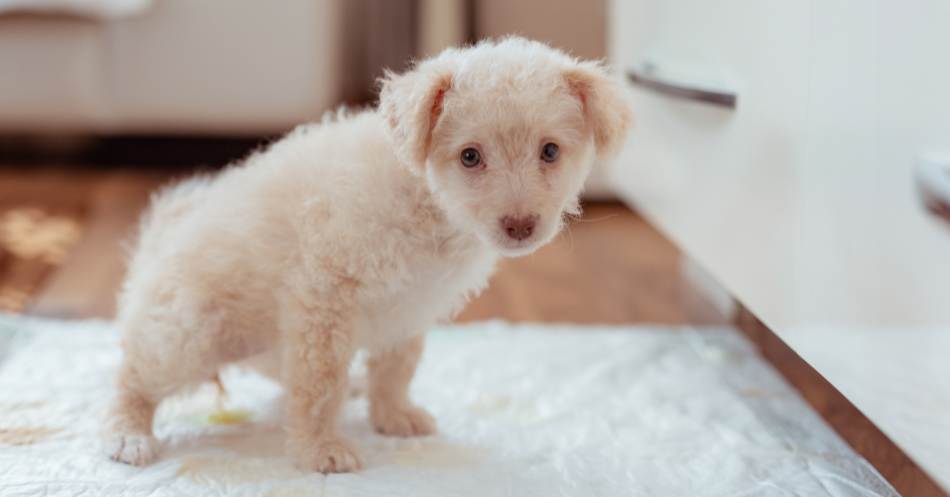

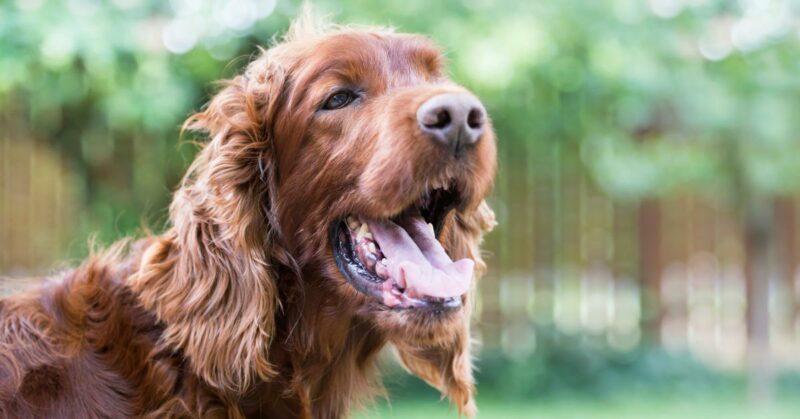
I am an experienced dog owner who adopted a senior dog that was severely malnourished with other signs of severe neglect when we adopted him.
He is a very loving dog and not aggressive but never been healthy because of everything he has been through in combination with his age.
We’ve got good vets and received second and even third opinions on right meds to control severe gastrointestinal issues that send him into cycles of severe vomiting and gas that landed him in the hospital just once over last five years we’ve had him.
What is frustrating to me is that despite following all this guidance including plenty of exercise and comfy place to sleep and early mealtime he is still extremely hyperactive, bouncing off wall at 2 a.m. in morning long after we are in bed (he even has his own bedroom at other end of the house) and it makes his physical issues worse.
Is there a point at which it makes sense to inquire as to meds rather than just food or routine to make him calmer?
Hi Tony,
Gosh, this is a tough situation! First, thank you so much for rescuing and loving him!
My number one recommendation is to talk to your vet or a veterinary behaviorist. Since he has underlying medical issues, it is hard to say if a change in his routine would help or not. That being said, dogs do thrive on routine. So I would still ensure he has some sort of regular routine. That can include making sure he eats at the same time each day, goes to potty after each meal, and goes on walks at the same time every day. Those things can help calm him down and make him naturally feel more tired at bedtime.
A Veterinary Behaviorist is trained in pet behavior and they often are not more expensive than seeing your regular vet. They can help you determine why he has his hyperactivity. You can find one near you here.
I hope this helps!
Kristen
I recently started fostering a senior Shepard mix (around 12 years old). He does not like his dog bed and prefers to nap on the couch or the floor. At night, all he does is pace, cry, and whine unless I am actively petting him. I understand how hard his life has been but any thoughts so I can get some sleep and be a good dog mom??
Hi Samantha,
Thank you for fostering! How long has it been since you first fostered him? It could be some anxiety associated with him adjusting to a new home/normal.
I would suggest making sure he has a clear schedule each day. Make sure he eats, goes out to the potty, goes for walks, and has a set playtime every day at the same time. This will help him get used to when bedtime is.
Before you go to bed, try giving him some calming treats. I love The Anxious Pet. They make hemp and hemp-free calming treats. My dogs love them, too! You can try them here.
If you find his anxiety can’t be resolved with treats, I really like Zyklene for pet anxiety. It is a supplement made out of dehydrated milk, and you just sprinkle it on his food so it’s easy to administer. You can get that here.
I hope that this helps! Thanks again for fostering.
We got.a Bernedoodle in August. He is turning 6 months this week. He has major anxiety. When we first got him he woke up every few hours to go potty at night which was normal. Then he started to sleep from 10:30 pm until 5:30 ish. I would take him to go potty and put him back in until 6:30 and take him out for the day. Recently he has become very anxious and we can’t put him to sleep he barks and cries. We have tried letting him bark and he will for hours on to no end. I have tried letting him go out of the crate for a few minutes then put him back in and 5 minutes later he barks again. I have given him socks from family members with their scent on it and that didn’t help. We tried melatonin but that doesn’t seem to be helping. I’m hoping there might be a suggestion of something else to try. We did do the training with putting him in with a treat in our hand with the door opened then the door shut with longer time increments. That works during the day and at night he gets upset. Hoping you could help. Thanks
Hi Jordana,
I am so sorry to hear about your puppy’s anxiety!
Does he have a set routine during the day? Having predictable meal, potty, play, and walk times are really important for dogs as they thrive on routine. Has anything changed in his routine recently? A change could also cause anxiety.
Since he is still so young, I would definitely talk to your vet about this change in his behavior. There could be an underlying issue he is trying to communicate to you.
I would recommend trying Adaptil diffusers in the room his crate is in. These release natural, calming messages into the air that only he can smell. I have had success with them in the past. CBD can also help to keep him calm at night. You can put some oil over his food at night when he eats. I love The Anxious Pet CBD oil.
I hope this helps! Please keep me posted.
Kristen
My puppy is 11 weeks old and I’ve had him for 2 weeks. I’ve been putting him in the crate every night and for every nap with no problem. Two nights ago he all of a sudden is anti the crate. Screaming in it, pooping in it when he’s been taken outside multiple times.
The vet seems to think it’s behavioral, that he’s boycotting the crate and recommended a baby portion of Benadryl. He fought that just as hard night 2.
He seems incredibly stressed. Gave him treats in the crate, his blanket, a kong full of peanut butter. Nothing is working. Any advice?
Hi Kelly,
Congrats on the new puppy! Puppies can be difficult to train. And, yours is still so little!
I would also assume this issue is behavioral, since he is still so young. The key to them sleeping in their crate is that they are actually tired when they go in there. So, ensure he has a set routine throughout the day – like plenty of walks, playtime, and set mealtimes. Then, when it comes time for bed, he will actually be sleepy.
Adaptil diffusers are also a great way to ease anxiety. Place his crate by an outlet and plug one in beside it. Adaptil diffusers release natural, calming messages into the air that only dogs can smell. This can help him stay calmer in the crate!
I hope this helps! Keep establishing that routine and ensure he gets enough exercise throughout the day.
Let me know how it goes!
Kristen
Tony is two. He loves to go to bed. He sleeps with me and my husband every night. This week he’s been keeping us up all night. Sitting on the edge of the bed wanting to get down. We take him out side but he just sits there. This is totally strange for Tony. He normally gets under the covers and is set for the night. He’s eating fine and still plays. Doesn’t seem to be in any pain. What could be the issue?
Hi Robin,
Have there been any recent changes to his routine? Disruptions in his routine can cause anxiety. If everything is the same for him, try ensuring he is going outside right before bed so he doesn’t have to go to the potty in the middle of the night. Also make sure that he is having enough exercise. Depending on his size, he may need to go on longer walks or have more playtime during the day to ensure he is actually tired at bedtime.
If you’re sure you are doing all of the above, you can try other calming methods, such as placing an Adaptil diffuser in your room. It releases natural, calming messages into the air for canines: The Anxious Pet also makes CBD and hemp products that are veterinary formulated for pets. I trust them, and my pets gobble them up!
Let me know how it goes!
Kristen
Hi! My dog Bella she’s 5-8 years old (Shes a resuce they didn’t know her exact age) she can’t sleep with anyone cause when she does halfway through the night she’ll bark and bark until we let her out and let her roam the house but she is also very loud. The past couple of months she’s been perfectly fine but up until this week she’s been freaking out every night and has been very aggressive when we try and keep her in the living room to sleep and she only stops when someone sleeps in the living room with her but we can’t always do that. Meds also dont work with her well and just make her more aggresive any tips on what I can do to help her or should I just bring this up with my vet?
Hi Che,
Aww, I am sorry to hear that Bella is having night anxiety. Did you recently rescue her? She could just be adapting to her new home.
I would definitely bring this up with your vet, especially if medication makes her more aggressive. In the meantime, Adaptil diffusers can help her feel more calm in her environment. They release all natural calming pheromones into the air. You can’t even smell them! Here is another non-medication option made from dehydrated milk, so it is all natural.
Let me know how it goes!
Kristen
Hi. I have a 13 yr old Peekapoo. We also have two cats. They all would sleep with us and sometimes he couldn’t get in the bed for the cats but once I would move the cats out of the way he would get in bed. My husband and I thought we needed a bigger bed for all of us. We got a king the cats love it, but my dog will not get in the bed, even if I put him in the bed he jumps right back down. He is ok in the floor under the bed for about 3 hours and then he is whinny until I get up and go somewhere else to sleep and then most of the time he is tickled to death and sleeps the rest of the night. Needless to say I am not getting much sleep. I just bought one of the round dog beds I am hoping that works. Do you have any other suggestions that I might could use the reason he is whinny so much. If I am at work and there with my husband he does not act this way, he says he is good as gold.
Hi Terry,
Gosh that is frustrating! It does sound like he is experiencing some kind of anxiety now that you have changed his normal sleeping spot. Have you ever tried CBD for him? Right before bed, give him a hemp treat or CBD oil to help him feel calm. I use The Anxious Pet for my dogs and it works like a charm!
If you don’t want to use that, try Adaptil diffusers in your bedroom. These release all-natural, calming pheromones into the air that only dogs can smell.
I hope this helps! Keep me posted.
Kristen
I have a 9 month old puppy, he slept all through the night for the first 6 months but started barking overnight and becoming quite aggressive around bedtime; biting when going to be picked up or moved in any way. The only time he will stop barking is if he knows there is a human in the room or awake and wandering around the house. My guess is some sort of separation anxiety but I don’t want to encourage sleeping in the bed with me, and am unsure on how to progress with this.
I’m so sorry to hear your puppy is having trouble. That is worrisome. Have you tried a calming treat like these chews from The Anxious Pet? I love that they are all-natural and rich in antioxidants. The ingredients also promote restful sleep! They may help your dog to calm down and relax before bedtime, even though he isn’t near you.
But if you’re worried that he’s showing signs of separation anxiety check out my blog post. This post explains training methods and treatments that may help your dog adjust to not being with you all the time. But if his symptoms are getting worse, mention your concerns to your vet so that you can find the best solution for you and your pup.
Kristen